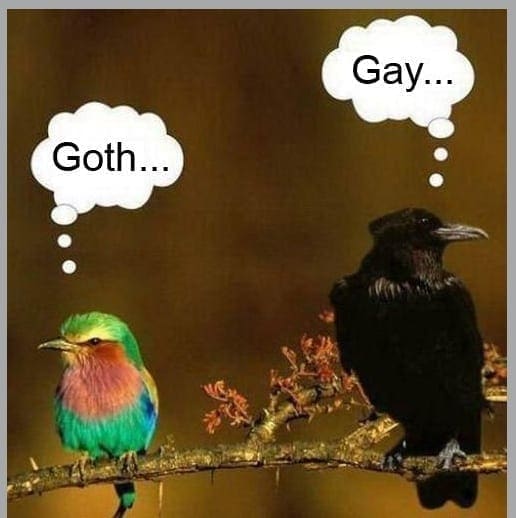
We all enjoy and love the company of people similar to us who share our mindset and views. It is a well-known and established concept that cliques form in life based on every situation inclusive of race, religion, economic class, work and more. In relation to anything and everything; likes and dislikes, alliances and exclusions are created. There are cliques of tea drinkers and coffee drinkers; smokers and non-smokers, cliques of studious students and the not so studious ones; those who watch Roadies and those who don’t; the talkative ones and the introverts; the hostelers and the non-hostelers; the Indians and the NRI’s… Cliques are a part of human nature and at their best, they provide a support group and means for a person; yet at their worst are a confining box limiting individuals therein.
The fundamental reason why cliques are created is deep rooted in a sense of insecurity and yearning to discover oneself existent in every individual; one that draws them toward a particular group of similar interest and foundations where they feel they ‘belong’. But the reality of life itself is that it takes years, for some a lifetime, to actually realize who we actually are; and we spend every single day discovering ourselves more. What people call ‘changing’ and ‘transforming’ in their lives is actually just another milestone in the journey of self-discovery by an individual.
Different individuals with different personalities and natures; coming from different backgrounds and spheres of life arrive and join the same university. Over time, opinions about one another are created and based on likenesses and other factors, groups are created. Friendships are forged. A beautiful, articulate, affluent, charismatic and powerful queen bee will arise; aided in her function by a group of wannabe’s who are delighted to be in her company. The wannabe’s strive to get closer to the queen showing that they are worthy by dressing in the queen’s style and sharing similar interests. They feel connected and comfortable. Another leader will arise in the form of the King Gunda; he will have a strict no girls’ policy and Pyaar ka punchnama will probably be his favorite movie. Then there are the foreigners; and the nerds who will purchase every standard book within the first week; and the sporty ones; and on and on it goes.
We may think that cliques do not exist at university level and we are well past all that in our school days; but in reality they are existent at every phase of life; and if you actually look around, they are manifest at every level.
Cliques are not always bad or wrong; in fact they tend to aid people in settling in and being comfortable with people, lead to development of relationships that last for a longtime down the road and aid in many situations. But the major problem comes in when cliques lead to confinement and suppression of one’s true potential or when self-limiting and no-admittance cliques lead to the judging and criticizing of another clique or individuals.
The topic of being judgmental towards others and the common trend of commenting and criticizing anyone who is not similar to us or different in any aspect is a whole other topic in itself; requiring deep individual assessment and is associated with the core moral and social values of a person. Judging someone based on how they dress, or where they are from, or for any unfounded reason for that matter reflects on the person doing the judging at an even greater level.
But speaking of cliques as being a confining box; it is often seen that different individuals may possess different talents and outlooks on things and may in fact feel comfortable and connected with various other things besides what they are mainly known for or beside what their group of friends involve in mainly. But due to cliques and the approval of an individual within it, this hidden potential may not be expressed and brought out by the person in fear of losing the acceptance of his/her clique. This may not directly involve taking part in something or performing or the like, but may involve a deep psychological factor when a person dresses up in the morning, or how they speak to the opposite sex, or whether or not they let their girlfriends ‘hold their reins’, and such similar concepts. This leads to a person inhibiting their own path of self-discovery and realization in order to live by social standards and gain acceptance.
The bottom line is the question, why do we seek other people’s validation? Why is it that who we are or what we strive to be is not enough? Why do we join or create cliques? Is it jealousy, or envy? Or are we just trying to fit in?
It all boils down to cultivating a strong core of self-confidence. Accepting who you are and being proud of that. Comparisons to others drain you of personal power, robbing you of a perception of your own uniqueness. Express yourself genuinely and take yourself out of the competition.
Breaking cliques and discovering oneself is of core importance; where a foreigner may find comfort and better relations in Kaprigudda; and the beauty and the brains of a batch could be best friends; where a sports star is a distinction holder; and you can be in the council yet rock drums too.
Let’s express ourselves as individuals for who we are and not classify and judge each other on the basis of cliques; for surely it is high time to move past the small, limited world of the clique. Meeting new people is energizing and stimulating. Moreover, friendships are forged on many levels fulfilling different needs. They don’t all have to be equally intense. By the same token, newcomers to any group need to be patient, taking things slowly and lightly. Friendships take time to deepen. And as for people who may not share our interests or views, who are we to judge?
Live and let live!
Share your thoughts with me at [email protected] or [email protected]



2 Trackbacks / Pingbacks